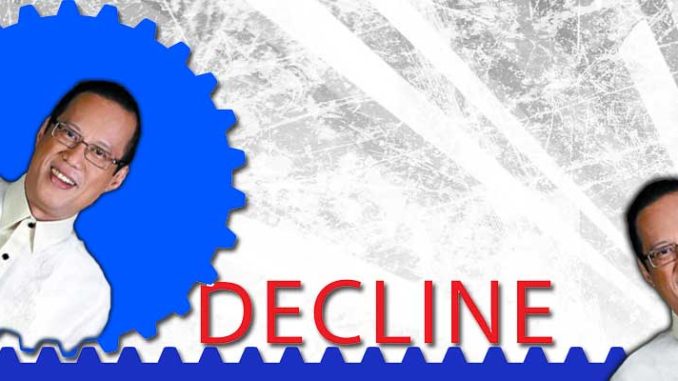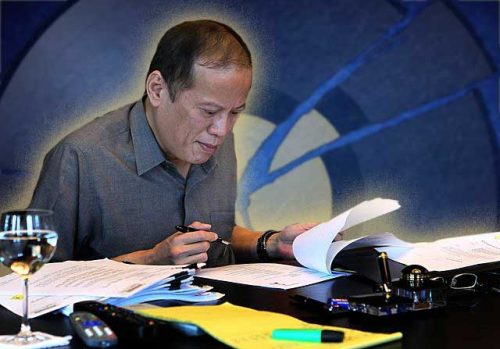
Roxas is probably right. Aquino, who ran on an anti-corruption platform, has never been accused of stealing or cheating. Through his pugilistic justice secretary, he has also filed cases against numerous public officials embroiled in corruption scandals; chief among them is the disgraced former President Gloria Macapagal-Arroyo. Most recently, the same justice secretary announced the government would charge its own customs chief—long considered a close Aquino ally—with malversation.
Integrity as a failsafe
Descriptions of Aquino’s honesty are the fail-safes of his communications team. Whenever Aquino’s detractors—mostly front organizations of the small but noisy Communist Party and members of the political opposition under Vice President Jejomar Binay—criticize the administration, the presidential palace never forgets to remind citizens of Aquino’s character. His upstanding morality, they note, stems from him being the son of the country’s two most prominent anti-dictatorship icons: former senator Benigno “Ninoy” Aquino and former president Corazon “Cory” Aquino—both staunch adversaries of the late strongman Ferdinand Marcos.
So far, the blunt public relations strategy has worked; Aquino has remained popular. But in the latter half of 2013, the presidency was beset by multiple crises, and Aquino’s much-vaunted popularity was tested. In July, the Philippine Daily Inquirer reported that 10 billion pesos (around 228 million USD) of legislators’ discretionary funds (popularly called the “pork barrel”) were channeled to ghost projects administered by bogus NGOs. Though Aquino himself was not implicated, the institution of the presidency is linked to the scandal, as it is the executive branch that releases funds to legislators. The power of the president to deny congressmen and senators to dip into the pork barrel allows it to exert undue influence on both houses of congress.
 Amid an increasing public clamor to abolish all discretionary funds to legislators, Aquino defended not only the legality of the pork barrel, but insisted that discretionary funds directed at local officials should address concrete needs. “The idea that they can identify projects for those who should be helped, it’s not inherently bad,” he explained in October. “What is clear is, there were those who abused it.” The Supreme Court disagreed; it declared pork barrel illegal on November 19, 2013.
Amid an increasing public clamor to abolish all discretionary funds to legislators, Aquino defended not only the legality of the pork barrel, but insisted that discretionary funds directed at local officials should address concrete needs. “The idea that they can identify projects for those who should be helped, it’s not inherently bad,” he explained in October. “What is clear is, there were those who abused it.” The Supreme Court disagreed; it declared pork barrel illegal on November 19, 2013.
Already reeling from the anti-pork sentiment, the political opposition dealt a painful blow to the president in October when it revealed that the presidential palace had realigned government savings to increase the discretionary funds of legislators. In 2011 and 2012, the Department of Budget and Management channeled 9 percent of a P142.23 billion-peso fund called the Disbursement Acceleration Program (DAP) to the budgets of senators and congressmen.
In a nationally televised speech, Aquino insisted that the DAP was legal (but given the recent Supreme Court ruling on PDAF, he is likely to be proven wrong). Feebly, he also emphasized that the money for legislators was only 9 percent of the fund. And more importantly, he reminded his audience that he was honest.
Sounding like a broken record
How far can Aquino use his reputation as an honest politician to stave off a precipitous decline in popularity and political capital? Perhaps not very long. The public Aquino that is being increasingly seen is a detached and stubborn personality—one who is quick to pin the blame on anyone but himself.
It is this same version of Aquino that is now confronting the aftermath of typhoon Haiyan. CNN’s Christiane Amanpour was correct to note that, despite the president’s formidable achievements as a reformer, the humanitarian catastrophe in the Visayas will define his presidency. His legacy is in peril.
Frosty and self-disciplined, Aquino seems to lack empathy for victims, or, at the very least, he lacks the ability to project it. Upon arriving in disaster-affected areas, his first instinct was to audit the performance of local government units, rather than publicly commiserate with them and their citizens.

There are very few similarities between Aquino, the reformer, and his corrupt predecessor Arroyo. But watching Aquino distribute relief goods to affected communities, it clearly shows his standoffish nature and how he lacks charisma. This is no touchy-feely president that connects seamlessly with the pain of others; he will not hug babies, and, unlike Obama, he will not shed tears for fallen compatriots.
In Tacloban city, a businessman told the president that mobs looted and pillaged the city. He asked the president to consider implementing a state of emergency. An annoyed Aquino responded: “But you did not die, right?” He may be the best president the Philippines has had in recent memory, but Aquino is increasingly becoming a public relations disaster.
Criticism Sticks
In times of national calamity, the country not only requires material help; it also needs someone to rally to. Aquino may not think he is doing anything wrong, but that is hardly the point in the popularity contest of Philippine politics. Not doing things wrong is not the same as doing things right. When Aquino comes off as an irritable aloof bureau-brat, it only turns people away from him. When the local and foreign media, fairly or unfairly, accuse the government of inefficiency amid the crisis, the criticism sticks.
One need not be a political analyst to predict that once opinion polls have been updated to factor in the DAP scandal and the response to Haiyan, Aquino’s popularity will take a dive. This is a shame. A lame duck president with a strong anti-corruption platform and significant links to civil society would be the latest of the litany of political disasters that have befallen the country.
If this comes about and adversaries sense blood, how will the political opposition exploit the crisis? What kind of disillusionment will set in when the touted messiah of Philippine politics fails to save? And given the seemingly changeless nature of politics in Manila, will it even really matter? For those among us who still believe in what the president stands for and his reform agenda, having to face up to these questions is very saddening.
Lisandro E. Claudio
Kyoto Review of Southeast Asia, (Issue 14), Young Academics Voice, January 2014
